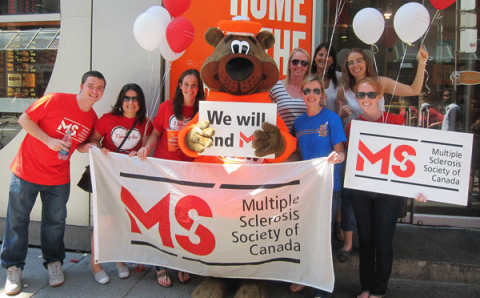
When A&W Canada staged its annual nationwide fundraiser Cruisin’ To End MS last month, Canadians were reminded that this country has the highest incidence of multiple sclerosis in the world. 100,000 Canadians live with MS, and every day, three more will be diagnosed with this disabling disease.
Last summer, I became one of them. My mother also had MS, which prompted me to seek out what is being done for patients in addition to 'cure' research.
The figures above just scratch the surface of the actual number of Canadians affected by MS and what’s important to them. I spoke with the Multiple Sclerosis Society of Canada’s president and CEO, Yves Savoie, to learn how funds from such initiatives are being used to improve life for Canadians with multiple sclerosis.
The neurological disease can affect balance, vision, speech and mobility.
A diagnosis of MS almost always provokes emotional distress from patients and those close to them. There is presently no cure, and new patients feel powerless and vulnerable as they begin a life-long passage through the healthcare system. It is right here where the Multiple Sclerosis Society of Canada enters into most patient stories.
“In the 24 hours following diagnosis, 50 percent of people who are diagnosed with MS make contact with the Society,” Savoie tells Samaritanmag of the organization founded in 1948. “I think one of our most critical roles is the role of information/support; and the slash here is very important because the information — which is about building confidence, reducing the anxiety — often also becomes a way of supporting the person who has been diagnosed.”
The Multiple Sclerosis Society of Canada has been providing services to MS patients and their families and funding research into the cause and cure for this disease since 1948. Today, the organization’s reputation, authoritative online presence and new ventures using social media, are shaping the Society’s future.
“Our website grows in importance every day as more people are connected,” offers Savoie. This organic approach to developing a community that is centred on the individual is important, he says, because “we want to take the person ‘where the person’s at.’”
“We find increasingly that people are diagnosed and will have a follow-up 10 to 15-minute conversation with an MS Clinic nurse and then will be sent away; and there are just so many questions that remain unanswered. There’s a tremendous level of anxiety about treatment and treatment choices, there is anxiety about the variability and the unpredictability of the disease and its course — not only for the person with MS but for their spouse, their children, their parents, all of their caregivers.”
To reinforce their commitment, “the Society will also serve people awaiting diagnosis quite specifically, because the period of wait can be long,” Savoie says.

In that respect, explains Savoie, “Our role may encompass other things — the whole relationship between MS and employment, for instance, in terms of guiding someone.”
These initial encounters, he says, may include “accompanying the person who wants to be anonymous, doesn’t want to register or declare their name. They may not yet be talking about MS to their spouse or girlfriend or employer at that stage.”
At the core of the Society’s work is “guiding people through our healthcare system in the broadest context,” says Savoie. “Helping people to navigate.”
“The encounter in the hospital with the neurologist is typically very brief,” he explains, “and then people are back into a place where they have to understand where to look to get drugs refunded, where to look to get home care on a continuing basis if there is a need, where to look for the pension incomes that come with the more severe disabilities if it has an impact on your employment status. We will both help people understand how to navigate, and, in some cases, we will also help people advocate for these things where people are most vulnerable.”
In the family environment, it will often be the caregiver who requires the assistance of the Multiple Sclerosis Society. “When we think of care-giving, we realize that happens in every direction when it comes to family connection and it happens across the typical age you think of a parent being who is caring for a child who is sick or you think of an adult caring for an aging parent,” says Savoie.
“We forget that sometimes, you’ve got a 12-year old caring for a mother, and that 12-year old as a teenager has to deal with responsibilities that are much greater than the responsibilities of his or her peers in high school, and it changes their life, their flexibility, and that’s the reality. It’s the reality of a system that leaves lots of responsibility to the family if a person with a significant disability is in the household.”
The MS Society has devoted a set of special resources for youth affected by multiple sclerosis at its satellite community, Someone Like Me. Launched with the help of Billy Talent drummer Aaron Solowoniuk, who was diagnosed at age 24, it's a web site for young people — young defined very generously — to create a virtual support community within a protective, collaborative environment.
“It is critically important because while young people with MS are being diagnosed at a growing rate,” says Savoie. “That rate is still decidedly small, happily, which means that if you’re diagnosed with MS at 15 or 16, you might be the only one at your high school or in your town, and to be able to connect with someone who has walked in those shoes is a really great source of confidence-building.”
While there are other ways the Society engages youth, Savoie offers, “Summer Camp, for instance, where we bring young people together, the online community is much more accessible and it’s there on a perennial basis.”
Uncovering the real needs and priorities of people affected by MS and making calls to action is the theme of mslistening.ca, a more recent addition to the Multiple Sclerosis Society’s family of web sites. The website presents current data collected from 6,000 respondents that include patients, their families and caregivers.
“Over the last 18 months, we have implemented a very proactive listening initiative to understand where people are and what the needs are and how to improve what’s important to quality of life. It has both confirmed, and revealed, some very important things,” says Savoie.
Some of the findings in the study show where deficiencies exist in the current system, particularly with regard to caregiver support, equitable access to care and employment and income supports to keep MS patients working and living in their own homes. To read the full summary report, Listening to People Affected by MS, download here.
What’s notable and interesting that has been revealed in the study, Savoie informs, is that, “Now, with disease-modifying therapies, people have a longer period of time without significant impairment.”
This is good news for patients and their families who will face rising cost of care as their level of disability progresses, and encouraged by this trend, it becomes even more important that the overall health of the patient take higher priority. Why shouldn’t it? Although there is no cure for the disease, very few people will actually die from MS. We will more than likely succumb to the same common medical conditions that permeate the greater population.
Savoie relayed that the Multiple Sclerosis Society is now in the midst of exploring a set of questions in the research arena that will gain more focus. “There are questions about, ‘How do I live my best life with MS?’ rather than answering the question, ‘How do I get rid of MS entirely?’
“For people on disease-modifying therapies, these are questions about exercise, smoking and smoking cessation, about the use of marijuana to manage pain, as well as food and diet and yoga. All of those things are where they are wanting more information and they are wanting to understand how it relates to the disease and relates to actually living better with MS.”
The MS Society offers a useful publication entitled, ‘Healthy Eating: A Guide for People with MS’ to assist with diet choices (download here).
“Today, most neurologists would say that a good diet, no smoking and a regimen of exercise that’s well-adapted to the person’s level of ability are building blocks of living well with MS,” says Savoie. “I would include vitamin D supplementation in that.”
While there has been no clinical trials to confirm the important role vitamin D plays in MS therapy, there have been many studies that point to its importance in maintaining bone density, immune-system function and cognitive function, among other benefits.
“The evidence base is not definitive,” explains Savoie, “but it’s very convincing and compelling, and how do you choose in that context? These are choices here that people can make and are important, and is a growing priority for us. It doesn’t detract from other things, including the eradication of the disease, that are very clearly important, but it introduces a set of questions that are about living the best quality of life possible.”
He adds, “These are the kinds of things that A&W allows us to do. The funds from our partnership impact every aspect of our work at all levels of the organization.” A&W Canada's recent Cruisin’ To End MS raised $1.45 million to add to its previous tally of $6 million.
"A&W, from the early days of the partnership, was intent to make sure that their funding would be layered in its impact — in the work that we do locally, in the work we do in the various provinces around the country and in the work that we drive at a national level — both in terms of the research agenda and in terms of improving the quality of life for people with MS," says Savoie. "Those funds trickle throughout the organization and touch every part.”
チェスターコート メンズ コーデ特集!王道コートを使った注目の着こなしを&おすすめアイテムを紹介 , メンズファッションメディア